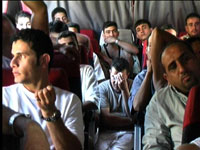Hundreds of Iraqis leave Syria, head home
In the first-ever convoy financed by Iraq government, hundreds of refugees left Syria on Tuesday and headed home to Baghdad, cautiously hoping the improvement in security means they can stay there for good.

Khaled Ibrahim, 45, from central Baghdad, said he was so homesick after having been away for a year, that he wanted to give it a try after hearing things in Iraq have improved.
"If I go and discover that the situation is not stable I will come back" to Syria, said Ibrahim, with his wife, three sons and two daughters in tow.
His elder son Abdullah, 13, helped load the family's bags in a small pickup truck that was to drive them to the buses parked about 800 meters (yards) away at the collection point in Damascus.
"I will go to school in Baghdad and explosions don't scare me," chirped Abdullah, in blue jeans and beige jacket.
Many shared in the optimism, waving Iraqi flags as they left in the convoy of over 800 people aboard 20 Syrian buses that were to ferry them to the border.
From there, buses sent by Baghdad would take over the returning refugees, according to Mohammed Ali al-Budairi, Iraqi coordinator for displaced Iraqis in Syria. The convoy was to arrive in Baghdad's neighborhoods of Salhiya and Mansour around 10 a.m. local time Wednesday.
The first bus left by mid-afternoon from al-Sayda Zeinab, an area in southern Damascus where thousands of Iraqi refugees have been living since after the 2003 U.S.-led invasion that toppled Saddam Hussein's regime.
Hours ahead, the neighborhood's main square was crowded with Iraqis carrying their belongings, some chanting: "Oh Baghdad, you are victorious."
"I miss my country a lot," said Ikram Jawad, 55, in traditional black abaya who spent eight months in Syria.
The Tuesday convoy is the first in the Iraqi government push to offer free rides and some plane tickets to encourage refugees here to return home and ease the burden on neighbor Syria.
Adnan al-Shourifi, the commercial secretary at the Iraqi embassy in Damascus, described the trip as a "test," the results of which have yet to be seen.
Syria has the highest number of Iraqi refugees in the region - estimated at about 1.5 million Iraqis - and says their influx has strained its education, health and housing systems, pushing the government to tighten visa requirements and to call for international assistance.
Damascus claims the cost of the Iraqi refugees' stay in Syria is about US$1.6 billion (€1.07 billion) a year.
Thousands of Iraqis in Syria have headed back home in the past weeks, mainly after Damascus imposed harsh visa requirements last month but also because of the improved security in Iraq.
The U.S. military says attacks across Iraq have fallen to their lowest level since February 2006, attributing this partly to a surge of nearly 30,000 troops earlier this year.
Besides the surge, many Sunni Iraqi fighters from Islamic insurgent groups turned against al-Qaida in recent months and are cooperating with U.S. and Iraqi forces in driving extremists out of their neighborhoods and villages.
In Jordan, another country with large number of Iraqi refugees, Iraqi ambassador Saad al-Hayyani told The Associated Press that Iraq will give Jordan US$8 million (€5.5 million) to share some of the refugee burden shouldered by the Jordanian government. Iraq's visiting Finance Minister Bayan Jabr was to hand the money to his Jordanian counterpart Hamad al-Kassasbeh later in the day.
In neighboring Lebanon, authorities sent back home Tuesday about two dozen Iraqis who were jailed for entering the country illegally, airport officials said.
Earlier this month, the Iraqi embassy in Damascus set up 11 registration centers for Iraqis to apply for the trip home. If large numbers show up, more trips will be arranged, al-Shourifi said. He said a big number of Iraqis are still reluctant to go back and consider the situation at home as not secure enough.
In Baghdad, government spokesman Ali al-Dabbagh, said the "Iraqi government is eager to have Iraqis return to their country and live a normal, safe life." More trips such as Tuesday's are expected in the coming days, he said.
The U.N. High Commissioner for Refugees office in Syria has said that some 60,000 Iraqis have returned to Iraq since last month.
But Sybella Wikes, press officer for the U.N. refugee agency here, said that the UNHCR doesn't "think it's time" yet for a massive refugee return.
"We certainly can't define the situation as being safe in any area in Iraq," she said but added the organization still would "support any Iraqi who wants to return."
Aziz Eid from Baghdad's once insurgent stronghold southern neighborhood of Dora said he hoped when he gets back it would be "safer than when we left."
Wearing the traditional Arab robe, he was busy planning as he boarded a bus home with his wife and three children.
"I don't own a house so I plan to rent one in Dora," he said. "I wish our government would give us homes, and if not, then at least plots of land so we can build."
Subscribe to Pravda.Ru Telegram channel, Facebook, RSS!


